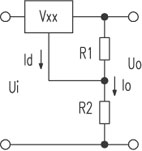A method for adjusting the output voltage of a three terminal IC voltage regulator circuit
Time:2024-02-11
Views:308
The fixed output integrated voltage regulator, such as the 78 × series, only requires two external resistors to conveniently increase the output voltage V0 (see the figure below), and its output voltage expression is as follows:
V0=VR1+VR2
=VR1+I0R2
=V××+(V××/R1+Id)R2
=V××(1+R2/R1)+IdR2

Among them, V × represents the output voltage of the IC. This is a complete formula, and its result is accurate. The expression of V0 is related to the static working current Id of the ground terminal of the fixed output regulator. When the Id changes, it will cause changes in the output voltage and load current, but due to the small Id value, usually only a few milliamperes, it has little impact on the accuracy of the voltage regulator. When the resistance values of R1 and R2 are relatively low, the term IdR2 can be ignored. At this point, the expression for V0 can be simplified as:
V0≈V××(1+R2/R1)
To ensure that the results obtained from practice match the calculated values, the application conditions for simplifying the expression are that the values of R1 and R2 must be selected to be smaller.
V0≈V××(1+R2/R1)
To ensure that the results obtained from practice match the calculated values, the application conditions for simplifying the expression are that the values of R1 and R2 must be selected to be smaller.
At present, some books and articles often overlook the above conditions and only recommend simplified expressions, resulting in contradictions between practical results and calculated values, often causing confusion and confusion for readers.
It should be noted that the 78 × (including 79 ×) series of stable voltage integrated circuits with fixed output at three terminals requires the application of an external resistor to increase the output voltage V0. According to the application data, IdR2 can only be ignored when V ×/R1>3Id, and V is allowed to be applied. Simplify the expression and align the practical and computational results.
Therefore, R1 should be selected
Assuming 3Id=20mA
The 7805 voltage regulator should choose R1<0.25k Ω;
The 7812 voltage regulator should choose R1<0.6k Ω;
The 7815 voltage regulator should choose R1<0.75k Ω;
The 7824 voltage regulator should choose R1<1.2k Ω.
From this, it can be seen that only when the value condition of R1 is met can the simplified expression of V0 be applied, otherwise the practice and calculation results may not be consistent.

|
Disclaimer: This article is transferred from other platforms and does not represent the views and positions of this site. If there is any infringement or objection, please contact us to delete it. thank you! |











